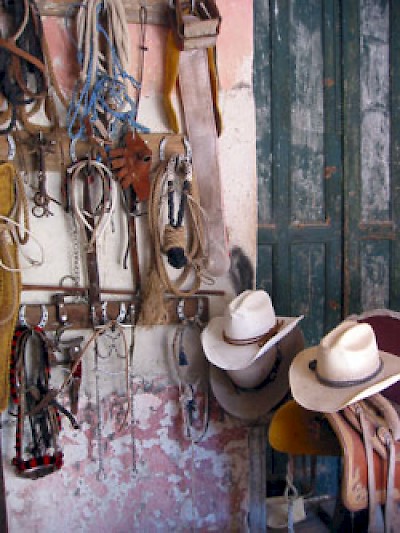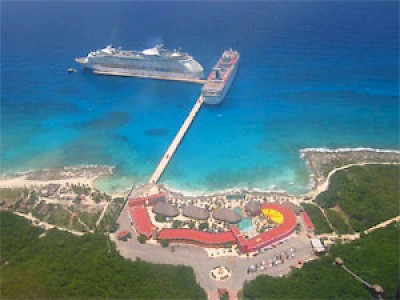Yucatan News: Cooking & Canada
Festival Sabor: San Miguel 08: Viking
The Festival Sabor, an international food and wine festival, sponsored by upscale appliance manufacturer Viking, was held in San Miguel last weekend. Merida's own Roberto Solis, from Néctar, was a huge hit at The Food Factory Restaurant. His presentation was in conjunction with Barón Balch'é wines and the review said: "The surprising ultra-modern cusine with Yucatecan roots and ingredients from a young, inspired chef is matched with the new wines from this Baja winery." Congratulations to Roberto Solis! We hear from people who attended that Señor Solis' dinner was very well received and he was a big hit at this festival. His reputation is growing and his talent is a source of pride for all Yucatecos as he represents us around the nation and around the world! We're looking forward to eating at Nectar again soon to try out some of the modern Yucatecan cuisine.
Mexican Migrants Welcome in Canada!
We are so used to seeing negative articles about any number of issues surrounding Mexican migrants that we almost missed the Edmonton Journal's "A Northern Welcome for Mexican Workers." It seems that Canada has a two year legal migrant program. Look at what they have to say about the Mexicans who have chosen togothere: "...many legal Mexicans now living in Alberta under temporary worker programs seem to be doing rather well. There are few nationals of any country more loyal to home and patria than Mexicans, and no doubt many will return after two years, hopefully with a solid nest egg to create new opportunities back home. One suspects all the money in the oilsands won't be able to make a Tapatio from Guadalajara or a Meridano hailing from the Yucatan warm up to a northern Alberta winter. But the hope is that some of our southern neighbours will also stay and find a new home here, making a contribution as immigrants to Alberta have done over the centuries. Our Mexican friends are more thanwelcome -- they're necessary -- and should be encouraged as such." Yucatan Living is so pleased to see a voice of reason in a sea of delusion about immigrants. Our heartfelt thanks to Canada for this forward looking, positive attitude.
>
Spring Blessing of the Fleet in Yucalpetén
This past weekend, Fr. Lorenzo Mex, coordinator of the Apostolado del Mar, used his Spring blessing of the Fleet sermon to beg the fishermen to not only be careful at sea, but also to spend their money wisely when they come ashore. Fr. Mex is concerned for the wives, mothers, and children of the fishermen, as well as for the fishermen themselves. So are we. It seems that at least two Yucateco fishermen have lost their lives with almost every Norte. We hope that this strange weather has come to an end and we all have a wonderful - and safe - Spring.
Rotarians Responsible for 10% Drop in Death and Illness
We often report on the Health Fairs held in Progreso, Motul, and Izamal, but here's some really wonderful new information about the effectiveness of these Rotarian-sponsored health fairs, which also happen to be held in Cozumel and Chetumal in the State of Quintana Roo. In every town where these fairs are held, the death and illness rate has dropped by 10%. This is because the culture of the people has never been focused on prevention. They tend to see a physician only after they get sick. The dramatic drop in deaths and illnesses is a direct result of vaccinations and new views brought about by community health education.
66 Children Taking English and Music Classes
Do you know where the Municipality of Calotmul is? That's about as rural as it gets, in Yucatan or anyplace else on Earth. This municipality is bordered on two sides by Tizimin, on a third side by Temozon, and on the fourth side by Espita. There are fewer than 4,000 inhabitants in Calotmul and its economy is based on agriculture. If you've been looking for the real cowboys of Yucatan (and maybe for a really fine saddle), you have found the right place. The main product of the artisans of Calotmul is Talabartería... which translates as saddlery, harness-maker's shops and leather goods shops. However, just because Calotmul is "a little bit country," doesn't mean the people are not interested in the educations and quality of life for their children. In tiny, rural Calotmul, there are 66 children taking English classes and they have now begun music lessons on woodwinds. Calotmul may be small, but you can surely expect her children to ride out of there one day - well educated and perfectly capable of building a bright future for themselves. The Municipality of Ticul is also providing English lessons for primary school students during school vacations. We'll just bet this type of studying either after school or during vacations does not go on many places in the world. Congratulations to the children of Yucatan and to the municipalities who have their children's successful futures firmly in sight.
Growing Latin American Economies
Brazil's GDP now stands at $1.31 trillion dollars, while Mexico is rapidly reaching $1 trillion dollars. This is in sharp contrast, of course to the nation with the largest GDP, the U.S., at $13 trillion dollars. However, the picture changes somewhat when we look at whose economy is growing and whose is stagnant and/or faltering. Latin America is a dark horse coming up on the outside fast and their future, if managed properly, is brighter than ever before.
Growing Mexican Mortgage Industry
The Government of Mexico is pushing to have 1 million new homes built in Mexico per year. Still, most of these homes are purchased with cash and the mortgage-backed debt market remains small. That having been said, Reuters reports that the Mexican arm of Spanish bank BBVA placed $100 million dollars worth of home loans with investors on Wednesday. BBVA said it sold almost 1,600 mortgages in the 1.1 billion peso 20-year issue, rated "AAA(mex)" by Fitch Ratings.
>
Trucking Program in Jeopardy
Last September, Yucatan Living reported that 100 Mexican trucks were headed onto U.S. highways and would be traveling as far away as the east coast. That has not materialized due to opposition from American workers unions. As of now, 18 Mexican companies with 62 trucks and 6 U.S. carriers with 46 trucks are participating in the NAFTA-supported program. Mexican trucks have crossed the border into the U.S. 322 times and U.S. trucks have crossed into Mexico 683 times. Unfortunately, the Mexican trucks have been limited to a range of only about 22 miles into the U.S. with trucking and safety groups still claiming that Mexican trucks are unsafe and that Mexican truck drivers "probably" cannot read English road signs. They also claim that American carriers are likely to eventually want to replace American truckers with less expensive Mexican truckers, leaving American truckers jobless. Those of us who live here know that such is not the case. The safety of Mexican trucks is certainly equal to or, in some cases, better than that of American trucks; and it is a 100% safe bet that there are far more Mexican truck drivers who speak English than American truck drivers who speak Spanish. As for Mexican truck drivers wanting jobs in the U.S., we seriously doubt that because their socio-economic position in Mexico is higher in Mexico than is the socio-economic position of their American counterparts in the U.S. We hope this issue is resolved soon and that it does not result in quite legal but understandably retaliatory tariffs by Mexico.
The San Patricios
Its time for St. Patrick's Day again, and time to remember the San Patricios (St. Patrick's Battalion). Most of these brave men left Ireland because of the potato famine. Coming to the U.S. to start a new life, they joined the American military almost as soon as they arrived. Unfortunately, they were Catholic and most of their officers were Protestant. They, along with Catholic immigrants from a number of other European nations, were badly abused because of their religion. They defected to Mexico where they fought with great honor against the Americans. Many San Patricios died heroic deaths during the Mexican-American war. Sadly, many who survived were either hanged by the Americans, or given 50 lashes and branded on their cheek with a huge D. More than 9,000 U.S. soldiers deserted during the Mexican-American War, and only the San Patricios were punished in this way. Some escaped and made a life for themselves in Mexico. Today, there is a monthly bagpipe honor service for them in Mexico City and the entire nation remembers their their sacrifice on both March 17 (St. Patrick's Feast Day) and Sept. 12 (the day they were executed by the Americans). We hope that all of our readers will take a few moments and consider the modern implications of the sad circumstances that caused the San Patricios to feel as if they had no choice but to change sides, and the heartbreaking circumstances behind their executions in 1847. We deeply appreciate that Mexico continues to remember these brave men whose only wish was to live in a land where they could raise their families in peace and where they would not be treated badly simply because of their religion.
UADY: 3 National Congresses of Chemistry & a Student Symposium
Contrary to popular belief, chemistry is NOT a mystical, unfathomable topic to be avoided at all cost. In fact - believe it or not - chemistry is one of the easiest subjects in school - and certainly one of the most logical and easiest to learn. The problem is... most (not all) chemistry teachers just can't seem to tell the story right and could care less about inspiring their students to continue to study chemistry. Yet, the fact remains that chemistry - in some form - is part of all our daily lives now and is certainly one of the areas in which young people have the most opportunities for rewarding careers. Toward making the study of chemistry a positive educational experience, over 300 educators from 11 states will meet at UADY, April 10 - 12, for the Primer Congreso Nacional de Química Sustentable and the Segundo Congreso Nacional de Química en Microescala. Techniques for capturing the imaginations of young people through the use of relevant (and fun) experimentation will be explored. But that isn't all... from June 23 - 27, Uady will host the XXII National Congress of Analytical Chemistry and the XII Student Symposium right here in Merida. The focus will be ways in which chemistry interacts with degree programs in Environmental Engineering, Chemical Engineering, Chemical Clinic, Agronomic Engineering, Biology and Nutrition. At the post graduate level, subjects covered will be Environment and Food, Medicine-Pharmacy and Health, Petrochemicals and Mining. It looks as if the Chemistry Department at UADY is gearing up for quite a Spring and Summer!
Expanded Role for CANACINTRA at UADY
CANACINTRA is a local industrial institute that represents all of the industrial interests active in Yucatan. Since 1987, CANACINTRA has worked with UADY in an advisory capacity, ensuring that the graduates of the university have the necessary background to ensure the success of their personal careers, as well as ensuring that their educational training meets the needs of industry. This role has been recently expanded with respect to the Departments of Chemical Engineering and Logistic Industrial Engineering. This has been an extremely beneficial relationship for both CANACINTRA and the graduates of UADY in that 90% of all chemical engineering graduates find work in industry in the State of Yucatan. The development of the Mayan Riviera is bringing a need for industrial engineers to our area and both CANACINTRA and UADY are working hard to have our graduates ready for the challenge. Congratulations to CANACINTRA and to UADY for their success in providing both education and opportunity that allows our young people to remain at home.
Costa Maya and Majahual 92% Complete After a $15 million dollar government infusion of cash, Costa Maya and Majahual have almost completely recovered from Hurricane Dean. From what we hear, they have rebuilt better than ever before and will now be able to handle huge cruise ships that haven't even been completed yet. Yucatan has been the beneficiary of their tragedy, since ships that once landed at Costa Maya are now landing here in Progreso. However, when they are up and running again, we will not lose all of that cruise business. During this time, several cruise lines have signed contracts to continue landing at the Port of Progreso and we are more than happy to welcome a continuing relationship with them. We are thrilled for Costa Maya and for Majahual and can't wait to see their new and improved facilities.















Comments
Adrian 17 years ago
I was born in an area in Southern Ontario where many Mexican migrant workers (as well as workers from other countries) spend time helping on farms and orchards. Visiting my father who still lives in the area, I have had the pleasure to find out first hand that these people are among the most hard working, friendly and delightfully interesting people. I am very glad to hear that we have such a successful migrant worker program in Canada.
Reply
cooking 17 years ago
[...] Yucatan News: Cooking & Canada [...]
Reply
Marilia 17 years ago
Hello
Please tell me again ( you did it one but I lost it ) how much will it cost for me to have an announcement, I am an AMWAY distributor here in Merida and I have some many products that all of you would need or look for..
thanks a lot and regards
Marilia Villarreal Garza
Reply
Carol Ann 17 years ago
Hola, yes Mexicans are welcomed in Canada. I live in a small town and we have thousands of mexicans come to work on our farms yearly. They are hard working people who deserve the respect & kindness we give to our own living here. I love mexico and travel several times a year to their country. VIVA MEXICO.
Reply
Ray 17 years ago
Besides the welcome to Mexicans working in Alberta, British Columbia has a large influx of Mexican workers employed in agriculture as well as the construction trade.
Reply
Steve 17 years ago
Well - some countries are more enlightened than others aren't they? You may be interested to know that Canada has welcomed migrant Mexican workers legally for over 30 years. Today, more than 20,000 Mexican agricultural workers migrate to Canada annually for seasonal employment on farms throughout Ontario, Manitoba and Alberta, etc. See what the Mexican consulate says about the program here:
http://www.consulmex.com/eng/agriculturalworkersprogram.asp
As someone living in the most popular region for Mexican workers, I see them often... as I do in Mexico - working hard in farm fields or, on off-days, congregated in conversation around town squares throughout southern Ontario or walking and bicycling along country roads. They blend in nicely with the communities they're part of - except for the heavy sweaters they wear when the rest of us are in T-shirts and shorts, enjoying what we consider to be sweltering summer weather!
Reply
« Back (10 to 16 comments)